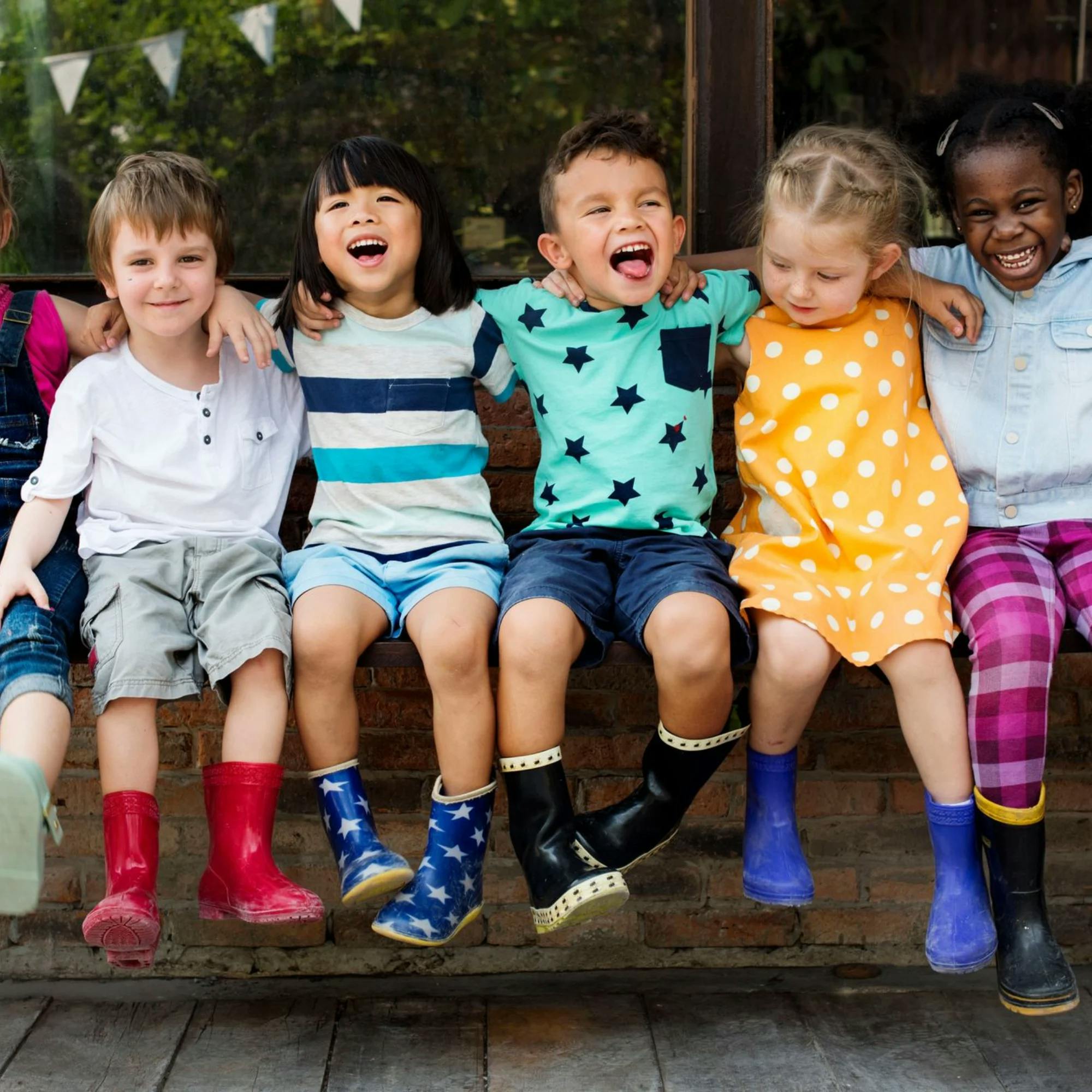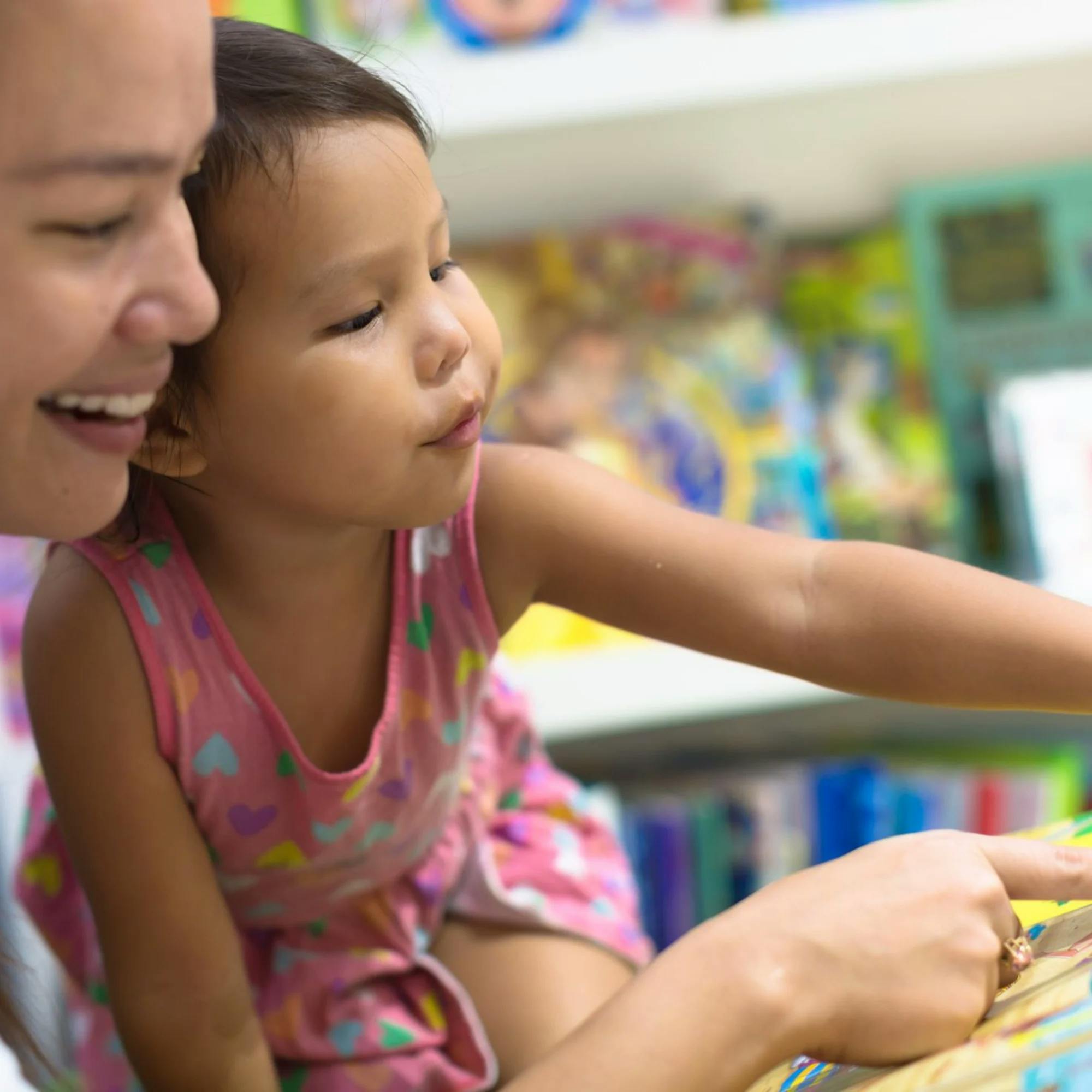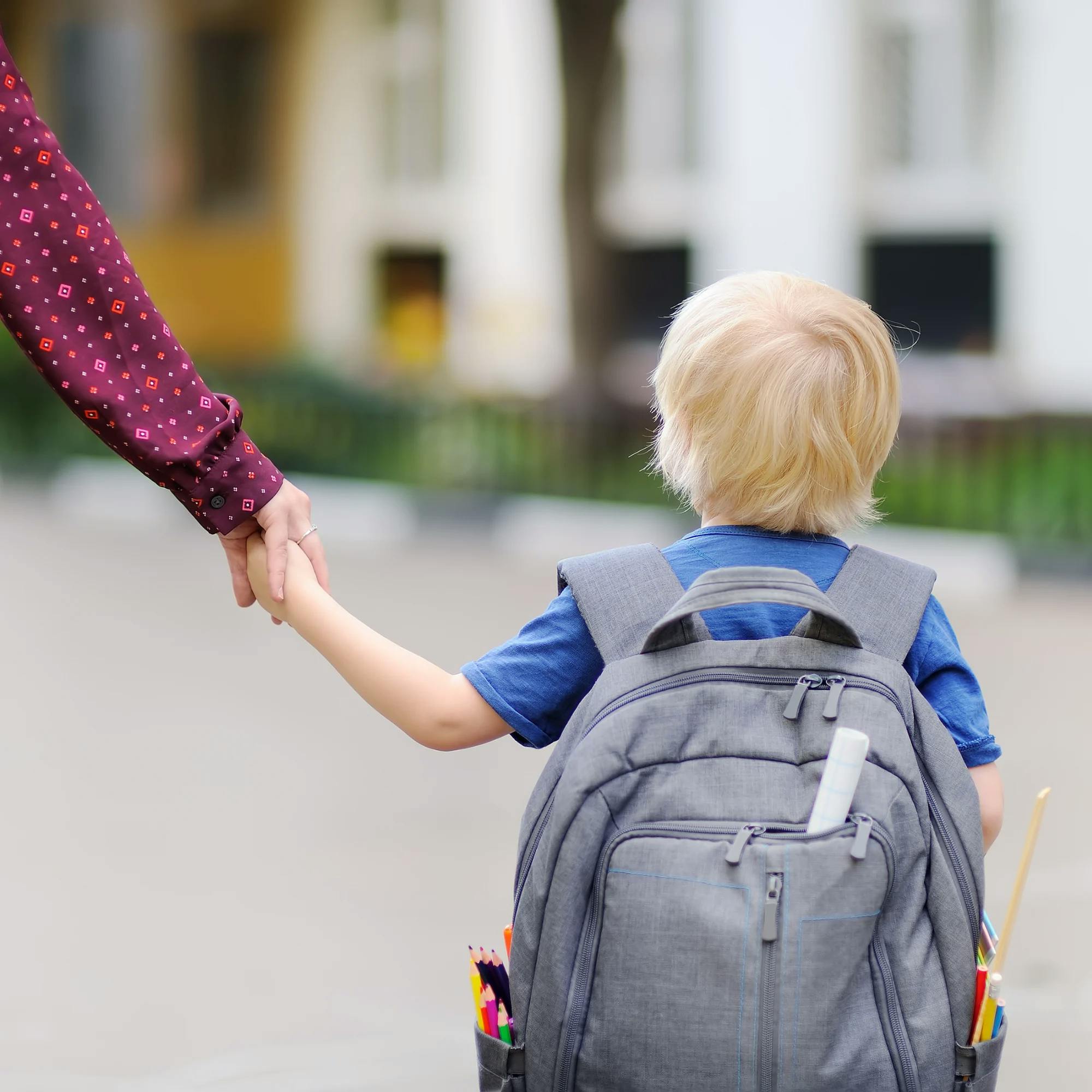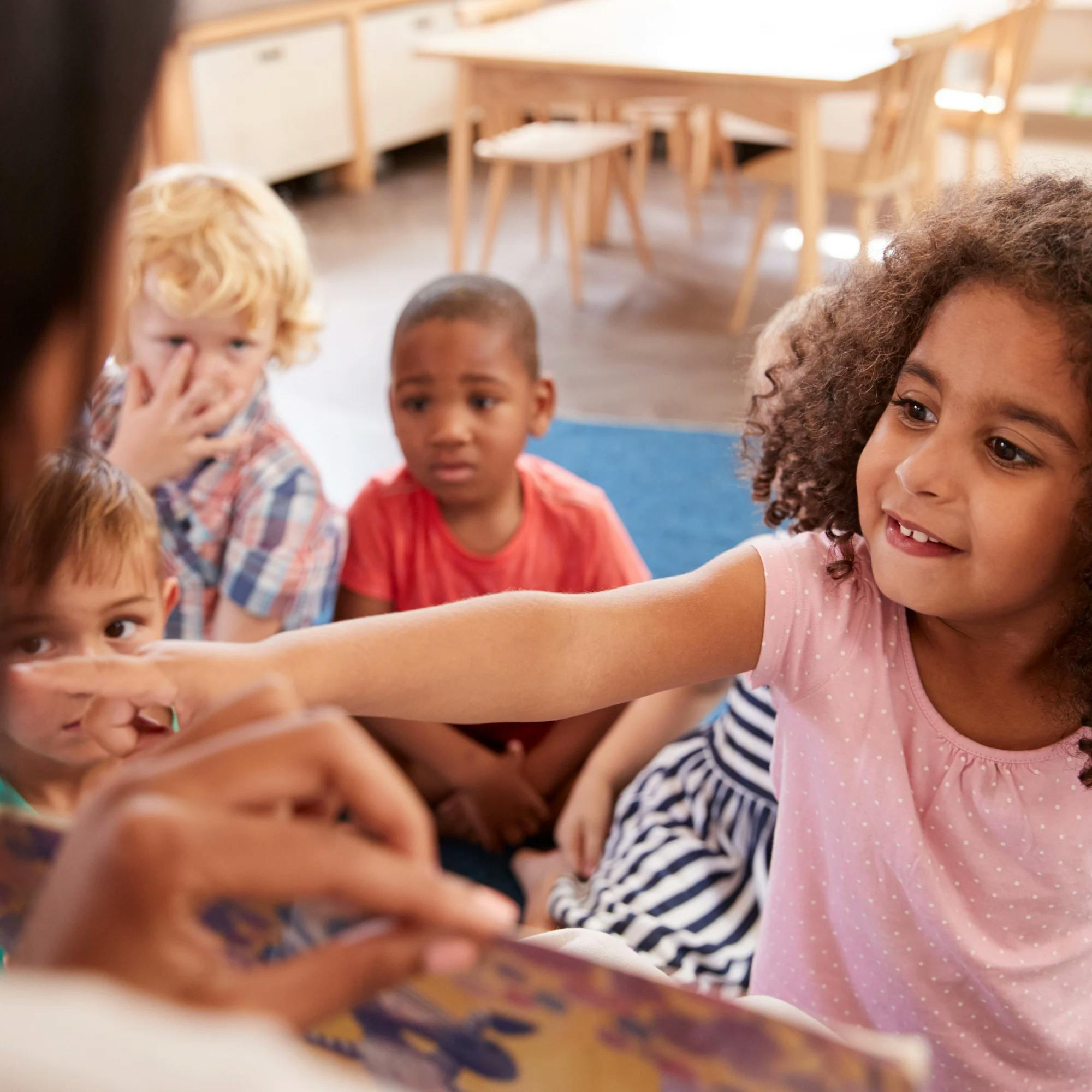Speech therapists are experts in childhood development, and we know that starting kindergarten is a big milestone–for both kids and parents! It’s natural to wonder if your child has the skills they need for kindergarten, or even to suspect that your 5-year-old isn’t quite ready yet.
Kindergarten readiness isn’t just about knowing letters and numbers. It also includes speech and language skills, early literacy, and social-emotional development. In this guide, we walk through what your child should know before kindergarten, as well as signs that they may need extra support. We also cover the key developmental milestones for 4- and 5-year-olds that will help you know if they’re ready for school.
Signs your child may not be ready for kindergarten
Kindergarten is a big step. Are you wondering if your child is ready to start school? Here are the main skills that children need in kindergarten, along with key signs that they may need a little extra time or support:
Social skills
Does your child show interest in playing with other children? Can they take turns and share? Cooperative play and the ability to interact with others are important for a smooth transition.
Emotional readiness
Kindergarten requires patience and persistence. Can your child usually handle small challenges without getting overly frustrated? Are they comfortable being away from you for a school day?
Communication skills
Can your 5-year-old express their needs to a teacher or classmates? Being able to ask for help, follow simple directions, and have a conversation makes it easier to participate in the classroom.
Attention and listening
Sitting for a story, following along during lessons, and paying attention are big parts of the kindergarten day. If your child struggles to focus for short periods, they may need extra practice with structured activities.
Independence
Kindergarteners are expected to manage basic self-care, like using the restroom, washing hands, and following routines. If your child still needs a lot of help with these tasks, they may need more time to develop independence.
Many children grow into these skills with time, and early support can make a big difference! If you have concerns, talk with your child’s preschool teacher or their pediatrician, who can guide you on the next steps. And keep reading–we dive deeper into each of these skills and the expected milestones for 4- and 5-year-olds below.
Curious or concerned?
Our free screener is tailored by age and covers all areas of speech, language, and feeding. Find out if your child might need speech therapy.
 Screener for children
Screener for childrenHow old should my child be when they enter kindergarten?
The age at which children start kindergarten can vary depending on where you live. Most states allow children to begin kindergarten if they turn 5 by a specific date, often around September 1. However, it’s important to know that laws also require children to be enrolled in school or an approved alternative program by a certain age, usually 6 years old.
If you’re unsure whether your child is ready for kindergarten, some states offer the option to delay enrollment by a year. This can give your child extra time to develop the skills they need to feel confident and succeed in school.
To get the most accurate information, check with your local school district. Many schools begin kindergarten registration as early as January, so be sure to stay informed about deadlines and requirements in your area.
8 ways to get your child ready for kindergarten
Kindergarten readiness matters. For example, in one study, 65% of teachers believed that not being ready for school can have a long-term impact on a child’s success later in life. In another study, the more ready a child was in kindergarten, the better their performance on standardized tests later, and the higher their grades in middle school. The study also showed that children who are more ready to start kindergarten are ultimately more likely to graduate high school on time.
If you think your child may need extra support, try not to worry. There are things you can do at home to help them build the skills they need for this new adventure. Your involvement can make a big difference in how prepared your child feels when they step into the classroom.
Here are 8 ways to get your child ready for kindergarten:
1 Encourage independence
Give your child small tasks like getting dressed, putting away toys, or helping set the table. Practicing self-care, like using the bathroom and washing hands, will also help them feel more confident at school.
2 Read together every day
Reading with your child not only strengthens their language skills but also sparks curiosity and imagination. Choose books they love, ask them questions about the story, and make reading a fun, daily habit.


3 Talk, sing, and play with words
Everyday conversations help kids develop strong communication skills. Describe what you see on a walk, sing songs, or make up silly stories together. These little moments add up!
4 Practice early writing skills
Let your child explore with crayons, chalk, or markers to build hand strength for writing. You can also practice tracing letters in fun ways, like using finger paint or drawing in sand.


5 Teach basic routines and social skills
Simple habits like following a schedule, taking turns, and cleaning up after playtime help children adjust to classroom expectations. Practicing these skills now makes for an easier transition.
Creating a structured routine at home that mirrors a typical school day can help your child adjust to the idea of a consistent schedule. Try to set regular times for meals, play, and quiet activities. This gives your child a sense of predictability, which makes the transition to school smoother.
6 Introduce a classroom setting
If your child hasn’t attended preschool, consider a kindergarten transition program or play-based learning opportunities to get them familiar with group settings and listening to a teacher. Look for extracurricular activities for them, too, like beginner sports or music classes. This can help them develop social skills and build friendships.
Try reading books about kindergarten together. This helps your child understand what to expect and frames school in a positive light. You can also do pretend play by acting out scenarios like meeting the teacher, sitting in class, or playing at recess. This type of imaginative play gives children a safe space to express their feelings and practice social interactions.
7 Listen to your child’s feelings
It's important to listen to your child’s thoughts and feelings about starting school. Acknowledging any worries they might have and talking through their concerns can provide valuable emotional support.


8 Know when to contact a professional
While there’s a lot you can do at home to prepare your child for kindergarten, some kids need extra support from a professional like a speech therapist. It’s important to understand the typical milestones for 4- and 5-year-olds, so you know when your child might need help. We cover the milestones for language, speech, literacy, and social-emotional skills below.
Expected language milestones for 4- and 5-year-olds
In kindergarten, children need to communicate with new people everyday: new friends, teachers, and other staff. It’s important that they be able to express themselves clearly.
How do you know if your preschooler or kindergartener is on track with their language skills? For 4-year-olds, you should see them:
Following longer sets of directions, such as 3- or 4-step directions. Example: “Take off your shoes, put them in the closet, then put your jacket away.”
Using time-based vocabulary, like “today,” “yesterday,” and “tomorrow.”
Describing emotions and feelings more accurately. They can express their own emotions and describe characters’ feelings in books.
Answering most questions clearly and correctly.
Growing their conversation skills, including the ability to talk to both children and adults and maintain a conversation.


Five-year-olds are typically able to:
Tell a short story about something that happened, with at least two related events.
Use grammatically correct, longer sentences, including compound and complex sentences.
Use expanded vocabulary with more precise terminology and fewer instances of using the wrong words.


Expected speech milestones for 4- and 5-year-olds
Communication isn’t just about how we use and understand language. It’s also about how clearly we speak and how well others understand us.
At 4 years old, you should see consistent improvement in your child’s ability to say all speech sounds. You may still hear some errors with the sounds /l/, /s/, /r/, /v/, /z/, “ch,” “sh,” and “th.” For example, /s/ might sound like “th” (“thock” instead of “sock”), or /r/ may be replaced with /w/ (“wace” instead of “race”).
However, by the age of 5, most children can pronounce almost all types of speech sounds. Your child’s speech should be mostly understood by any conversation partner, whether a family member or an unfamiliar person, about 75% to 90% of the time.
By age 5, most children can pronounce almost all types of speech sounds. Your child’s speech should be mostly understood by anyone.
Because kindergarteners will be around more people every day, it’s important for them to be understood by others. The ability to communicate clearly helps children grow their confidence and self-esteem. If they’re always being asked, “What did you say?”, they may not want to speak up or engage with others as much.
Clear speech is also a safety issue. As caregivers, we never want our children to be in an emergency situation. But if they are, their speech should be clear enough to communicate and answer important questions.
Literacy skills for 4- and 5- year olds
Clear communication is closely linked to a child’s ability to develop strong early literacy skills. Although 4-year-olds probably aren’t fully reading and writing yet, there are some foundational skills they should be developing. These include:
Enjoying stories, whether told aloud or read in books.
Understanding print concepts, such as how words in a book correspond to the story and identifying the front and back of a book.
Recognizing at least 10 letters, including letters in their own name.
Beginning to rhyme by identifying words that sound alike.
Early writing skills, like attempting to write their name or other letters.


By 5 years old, these literacy skills should progress further. Your child should be:
Understanding book orientation. Understanding that text is read from left to right and top to bottom.
Identifying uppercase and lowercase letters and their corresponding sounds.
Matching spoken words to words in the book. When listening to a story read to them, 5-year-olds should start to understand which word on the page matches the word being said. They likely won’t be able to do this with all words, just some.
Identifying sounds in words. A phonological awareness skill you should see is the ability to identify sounds in words, especially the beginning sounds. So a 5-year-old should know that bat begins with /b/ or mine begins with /m/. They may even be able to identify the middle and ending sounds in words, as well.
Reading sight words. Sight words are words that are memorized and read quickly just by looking at them. These are words that come up often in text, such as the, a, is, my, I, or, was, you, are.
Writing uppercase and lowercase letters. Your child’s writing may not be very neat yet, and that’s OK!
Writing familiar words. 5-year-olds should be able to write their own name and even some other names or words they hear often.
Attempting to spell and write new things. Kids this age should also be trying to spell new words, even if they’re wrong. They may even try to write stories of their own.


Social-emotional skills for 4- and 5- year olds
Many parents watch for reading readiness and even communication skills before kindergarten. But social-emotional skills matter, too. In fact, having these skills helps kids succeed academically:
Cooperating with other children in a group
Following directions in the classroom
Regulating emotions and responding to situations with appropriate behavior
Playing kindly with other children
Resilience, or the ability to continue working on tasks that may be new or challenging; not giving up easily
Problem-solving for issues that could arise in the classroom
You can learn more about social-emotional skills for kindergarten in this article. Many of these skills can be learned through strong preschool programs.
What to do if your preschooler isn’t meeting milestones
If you notice that your preschooler isn’t on track with their speech, language, or literacy skills, talk with your pediatrician. They can refer you to a speech-language pathologist. You can also contact a speech therapy clinic yourself to share your concerns and discuss any support your child might need.
For behavioral or social-emotional difficulties, a family therapist may be recommended. But keep in mind that it’s not uncommon for children who have difficulty expressing themselves to also have difficulty with emotions or behavior. Improving speech and language abilities, along with working with a family therapist, can lead to improved social-emotional skills.
Expert support for your child
Speech therapy can help children with reading, writing, and spelling challenges. Get matched with the right therapist for your child today.
 Get started
Get startedHow speech therapy can help prepare children for kindergarten
Speech-language pathologists, also known as speech therapists, play an important role in helping children develop the communication skills they need to thrive in kindergarten. Through personalized, play-based therapy sessions, a speech therapist can address a range of communication challenges that can make the transition to school feel overwhelming. Therapy sessions focus on building essential skills like talking, listening, and understanding directions, which are critical for success in the classroom.
Family involvement is key to this process. When parents practice speech therapy strategies at home, they create a supportive, consistent learning environment that helps kids make steady progress. This teamwork between families and therapists ensures that children can practice their skills in everyday situations, giving them a strong foundation as they prepare for school. Early intervention, or starting speech therapy early, can have a powerful impact. It sets children up on a path for success by boosting their confidence and readiness for kindergarten.


How to decide if your child is ready for kindergarten
Every child develops at their own pace, and it’s completely normal to have questions about whether your child is ready for kindergarten. Talking with your pediatrician is a good place to start. In addition, many elementary schools offer screenings or appointments where professionals can assess your child’s readiness. They can provide guidance on whether your child would benefit from additional time or support before starting school.
If you decide to wait another year before starting kindergarten, you’ll have the time to help your child build the skills they need to succeed. You can support their development in fun and engaging ways at home, as well as begin any therapy they need to grow their skills.
Kindergarten is an exciting transition, and with encouragement, patience, and practice, most children adjust quickly. The goal is to nurture their confidence, independence, and curiosity. Their academic skills will follow naturally as they grow!
Have questions? We’re here to help!
At Expressable, our team of experienced professionals is ready to answer your questions about your child’s speech and language development. If you’re wondering whether your child could benefit from a speech evaluation, don’t hesitate to reach out. Early intervention can make a world of difference, so don’t wait! Find the right speech therapist for your child here.
How Expressable Can Help
Concerned your child isn't reaching age-expected milestones? Looking for communication support from a professional? Expressable is a national online speech therapy practice serving children and adults. We treat all major areas of communication and feeding, offer flexible hours including evenings and weekends, and accept most major health insurance plans. We’re proud to have earned more than 3,000 5-star reviews from our clients (4.9/5 average).
Our therapy model is centered on parent and caregiver involvement. Research proves that empowering caregivers to participate in their loved one’s therapy leads to better outcomes. That’s why we combine live, 1-on-1 speech therapy with personalized education and home practice activities for faster progress.
Communication is more than words. It’s how we share how we feel and show who we are. We’re here to help you or your child do just that.

 Abby Barnes, M.S., CCC-SLP
Abby Barnes, M.S., CCC-SLP








